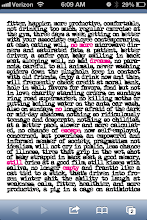At first I had a hard time trying to figure out how these essays went together. I should rephrase that....I have no idea how Locke's ideas fit in with the others that are obviously about print culture and the changes in law about printing. I was trying to figure out if it was just a general commentary about how things beginning to become less chaotic and monarch mandated. I thought that the Act of Anne was a way for the people to enter into a compact to bring printing up from nature and into the realm of reason and rationale. And then I realized we were supposed to only read Of Property...
So after re-reading Locke, I came to another conclusion. It seemed to me that the basis of Locke's argument was that if you do the work, the property is yours, except in those cases wen the property is common property and shared by all. This can apply to these things in two ways. First, in the case with the women in the printing house, since they were doing the work, it would only be natural for them to be recognized as the owners of the property that they were so heavily engaged with. Since they took ownership of the work, it should be theirs. The most important distinction here is that these women were not just working for a publisher, but they were involved with the actual running of the publishing business.
when it comes to publishing the written stuff, it seems like this could be interpreted in two different ways. On the on hand, when a writer writes something, he or she writes it for a public audience to read, share, think about, comment on, etc. In this case, the writing would be considered part of what Locke would call a common property and should not be regulated in any way, giving anyone the right to copy, distribute, and/or use the text in any way they feel is good and right and in the best interest of the common good. The Act of Anne does recognize this in a way and give power to the people to contest over-priced books which would conflict with the interest of the common good which was to promote the ideas of books and make them readily available to people.
On the other hand, there is a divide between rights by labor because even though the author wrote the book, the printer was the one distributing it, technically being able to take ownership for the distribution. However, from reading the Act of Anne it was not really clear if the act was in favor of the author or the bookseller. Maybe it was unclear because of the ambiguity of who does or should own a text once it goes into the printing stages. Hopefully we can clarify this a little bit because reading 18th Century acts alongside John Locke is not my cup of tea....
Here, due to the compact I have entered with my sovereign, Professor Maruca, is my February 17, 2009 post......did I mention how much I really dislike Locke and his sovereign compacts????
Tuesday, February 17, 2009
Subscribe to:
Post Comments (Atom)




No comments:
Post a Comment